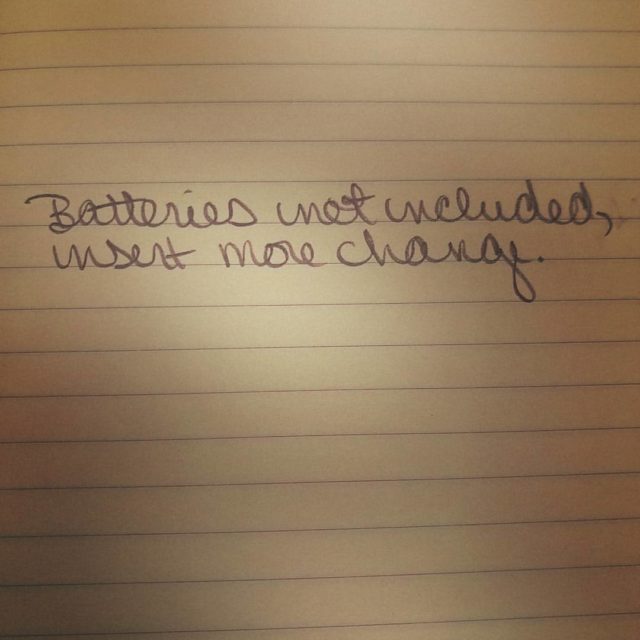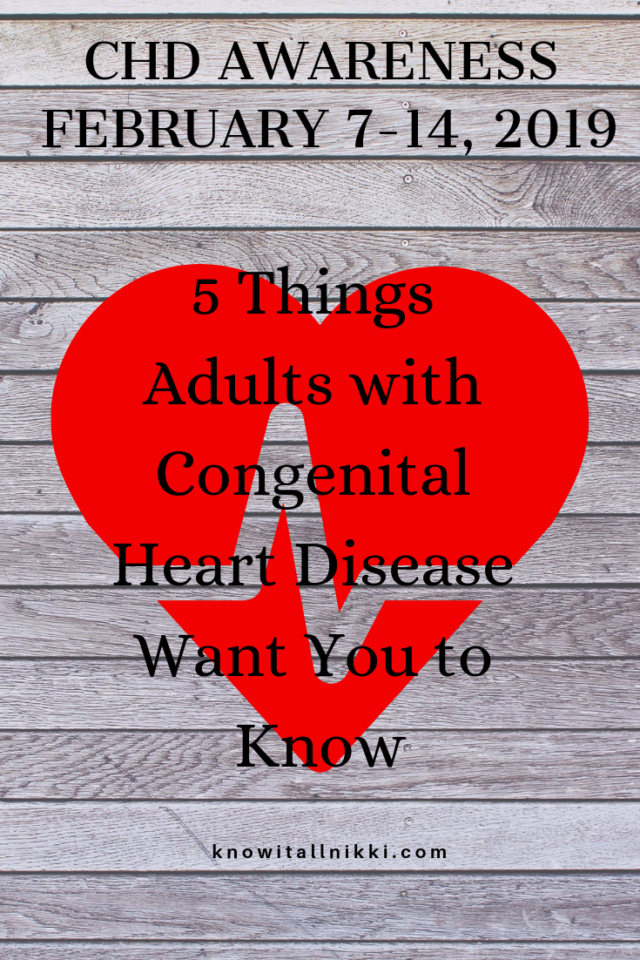Today is day two of CHD Awareness week and I thought this would be the perfect time for me to kick off a new theme that I hope to do every month: 5 For Friday. I’m sure there are others in the blogosphere doing something similar so it’s not like I’m reinventing the wheel here, but I come across all kinds of cool things every day and I think this is a great way to share some of my faves without going crazy and bombarding you with lists.
It’s estimated there are 40,000 babies born every year with a congenital heart defect. CHDs are one of the most common birth defects but there are many issues about living congenital heart disease past childhood that heart-healthy people don’t know or understand.
I think one of the biggest is the idea that once we have surgery as infants or children, that we’re better, or “fixed” and nothing could be further from the truth. Jimmy Kimmel even got it wrong when he talked about his son; his defect was corrected but his son will live with his CHD for the rest of his life. It doesn’t mean there won’t ever be a setback or another surgery for him. It doesn’t mean he won’t develop other heart-related problems as a result of his CHD, as he grows and ages, so does his heart and the potential for future problems.
Some of us are born with MULTIPLE heart defects and our lives feel like a constant revolving door of doctors and surgeries.
That said, there are many things that people with normal, healthy hearts don’t know about us. I’ve been asked some pretty funny questions over the years and some pretty strange ones too! But I didn’t want you to only hear what I think you should know so I asked some of my fellow Transposition of the Great Arteries friends what they’d like others to know. Here are the most popular answers:

- We are almost always tired. Some people assume we are lazy because we may not have an active (or active as their coworkers, family, friends, or colleagues) lifestyle. Some days are more active than others because we’re having a good energy day but know that we tire easily. One fellow TGAer had this to say:
When I say I’m tired, don’t come back with “I know the feeling” – you don’t. When I say I need a moment to rest, I mean I NEED to rest. Just because I walked for an hour yesterday, doesn’t mean I can do that today. It’s not being lazy, giving up or being stubborn.
2. We know our limits, please don’t tell us what they are. It was frustrating enough to grow up being told what you could and couldn’t do. For some of us, it set into motion a lifetime of not living outside of our comfort zones. (I’m guilty of that one.) But now that we’re adults, we have a pretty good idea of what we can or can’t do along with what we should or shouldn’t do.
If I say I can do something, let me do it. If I say I can’t do something, don’t force me. We self-limit very well. We know our own hearts intimately and we understand our exercise tolerance (even before we know there’s a term for it) better than anyone because we live it.
3. We are resilient and independent. I mean, we’ve had to be. As children, we often endured a ton of ridicule, from teachers and other students who didn’t understand what it means to have congenital heart disease. Because of this, some of us aren’t very good at opening up and some of us are open books because if we tell you all of it now, it won’t hurt as much to get rejected.
having a defect hasn’t made my life horrible, I’ve just had other, unique opportunities for learning, self awareness and blessings.
4. Please don’t judge us for our life choices. This is such a loaded issue among the Adult CHD community. Many of us are judged on what we eat and drink. We’ve heard comments like “are you sure you should be eating that?” and the ever-popular side-eye if we want to have a glass of wine or a beer.
I like to drink. Just shut up and let me have a glass of wine ????
5. Don’t forget about us. As of November 2018, the CDC reports, there are roughly 1.4 million adults living with CHD as opposed to 1 million infants and children combined. Yet, adult congenital heart disease is grossly underfunded as are congenital heart defects as a whole. Growing up and aging out of pediatric cardiology puts us at a greater risk for problems. We often get lumped into general cardiology practices because there simply aren’t enough doctors who specialize in adults with congenital heart defects.
Just because we may not look sick on the outside or we have a couple of good days doesn’t mean we are fine and certainly doesn’t mean we are healed.
We are the ones the doctors are learning from so that one day babies born today will live long past us.
We endure so much for future CHD babies everywhere.
We are the pioneers.
What else would you like to know about living as an adult with a CHD? Ask in the comments or shoot me an email: knowitallnikki@gmail.com


Great work, I go through almost what you have said my name is faith am an adult with CHD am working and it’s challenging especially getting tired and am not lazy people may judge me on that but I can’t keep telling everyone my condition. But am glad am awareness will educate people about people like us in the society.
I am so glad this resonated with you! It gets tiring when we tell someone new to us our story. Especially doctors! Sometimes I just want to scream, “my chart is right in front of you, look!”